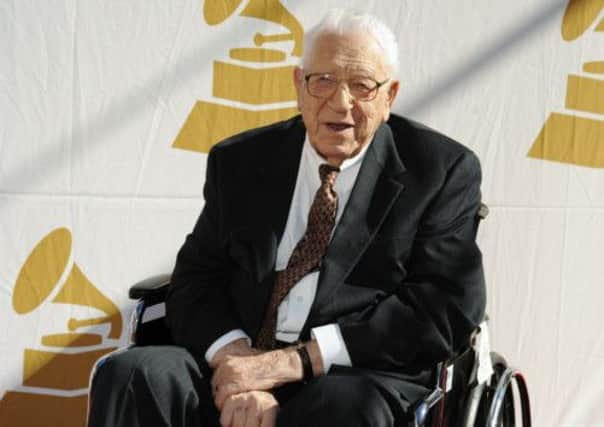Obituary: George Beverly Shea, baritone


WITH his booming baritone and crystal-clear diction, Canadian-born George Beverly Shea sang “live” to several hundred million people around the globe, and sold millions of records, as chief gospel singer to the evangelist Billy Graham for more than half a century.
That included the Rev Graham’s famous “All-Scotland Crusade” in 1955, a turning point in Scottish religion during which he and Shea preached or sang to 2.5 million Scots and saw some 50,000 walk forward to “give their hearts to Jesus”. (Graham himself is of Scottish descent.) Shea’s powerful voice was seen as influential in converting a fair number of those who streamed forward to the organ strains of the hymn Just As I Am. With more than 70 albums to his name, he became the most widely heard gospel singer in history, listened to, as someone once wrote, “from North Dakota to North Korea”.
Advertisement
Hide AdAdvertisement
Hide AdSinging hymns such as How Great Thou Art, The Old Rugged Cross and I’d Rather Have Jesus (he wrote the music for the latter), Shea mesmerised audiences almost as much as the Rev Graham did.
Of the thousands who queued for up to four hours to get into Glasgow’s Kelvin Hall every night for six weeks in 1955, entering beneath a huge banner declaring “Let Glasgow flourish by the preaching of the Word and the praising of His name”, 470 walked forward for conversion on the first night alone. Church attendance in Scotland surged after Graham’s crusade although opinions differ as to the longer-term effect.
Graham said he chose Glasgow to start his crusade because of “a reputation as the most sinful place in Britain. I believe the flames that burned in Scotland centuries ago can burn again. A spiritual awakening in Scotland will encourage the entire world at a very critical period (the Cold War).”
When Shea sang I’d Rather Have Jesus in the Kelvin Hall on Good Friday 1955, a BBC broadcast won the biggest audience since the Coronation two years earlier. He and Graham also drew 90,000 to Hampden Park and more than 20,000 to Heart of Midlothian’s ground at Tynecastle Park in Edinburgh, where several hundred people came across the running track for conversion.
How many Hearts fans were in the crowd that day cannot be known but supporters appear to have picked up on the hymn Blessed Assurance – “This is my story, this is my song” but changing “praising my Saviour all the day long” to “follow the Hearts and you can’t go wrong”.
Shea returned to Scotland with the Rev Graham for another tour in 1961.
George Beverly Shea, widely known as Bev, was born in 1909, in Winchester, Ontario, one of eight children of a Wesleyan Methodist minister father and a mother who played the organ in his church.
As a boy, he wanted to be a Mountie (the Royal Canadian Mounted Police) but played piano, organ and violin from an early age, also singing in his dad’s church choir. He moved to the US to attend a Christian college in New York state but left without a degree to help support his family during the Depression.
Advertisement
Hide AdAdvertisement
Hide AdFor ten years he worked as an insurance clerk in Manhattan, taking voice lessons in the evenings. He was 23 when he found a poem by Rhea Miller and put music to it, creating what would become one of his signature songs, I’d Rather Have Jesus (than silver or gold).
In 1947, a young Southern Baptist minister named William Franklin (Billy) Graham Jr, who had heard him sing on the radio, invited Shea to join him and musical director Cliff Barrows for the first of what Graham called his “crusades” in Charlotte, North Carolina. The trio would travel the world together for more than 50 years.
Shea recorded at least 70 gospel albums, winning a Grammy award in 1966 for the album Southland Favorites, recorded along with the Anita Kerr Singers. In 2011, at the age of 102, he received another Grammy, this time a Lifetime Achievement Award, for which he turned up in person. That made him the oldest Grammy winner of all time.
During his career, he appeared on Dr Graham’s TV and radio shows and sang at prayer services in the White House for presidents from Dwight D Eisenhower to George Bush Sr. “The people didn’t come to hear me,” he said in a 2009 interview about his career. “They came to hear Billy. To get to hear him, they first had to listen to me.”
Shea settled in the small town of Montreat, in the Blue Ridge Mountains of North Carolina, where the Rev Graham was a near neighbour and still lives. “I’ve been listening to Bev Shea sing for more than 50 years,” Dr Graham said in 1997, “and I would still rather hear him sing than anyone else I know.”
George Beverly Shea’s first wife Erma (née Scharfe) died in 1976 after 42 years of marriage.
He is survived by his second wife Karlene (née Aceto), whom he married in 1985, and by two children, Ronald and Elaine, from the first marriage.
PHIL DAVISON